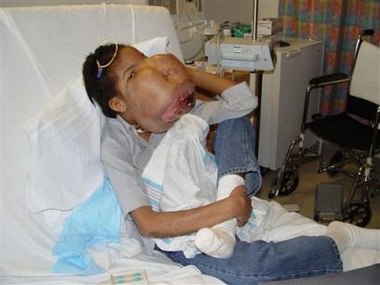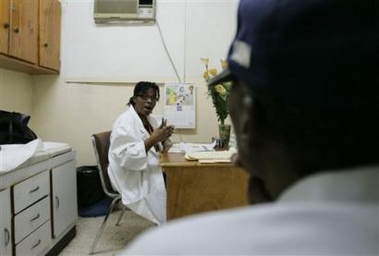 |
 |
 |
 |
| Want to send this page or a link to a friend? Click on mail at the top of this window. |
| Posted Thursday, December 15, 2005 |
| Haitian girl has surgery for 16-pound tumor on face |
| By The Associated Press |
MIAMI, Florida, Dec. 15, 2005 (AP) -- A 14-year-old Haitian girl was in critical yet stable condition Thursday morning after groundbreaking surgery to remove a 16-pound (7.2-kilogram) tumor-like mass from her face.
Doctors at Holtz Children's Hospital finished operating on Marlie Casseus about 11:40 p.m. Wednesday, nearly 16 hours after the procedure began about 8 a.m., said Robert Alonso, spokesman for the hospital.
It was unclear what the outcome of the surgery was.
The operation is the first of many Marlie must undergo. The teen suffers from a rare form of Polyostotic Fibrous Dysplasia, a nonhereditary, genetic disease that causes bone to become "like a big bowl of jelly with some bone inside," according to University of Miami School of Medicine's Dr. Jesus Gomez, one of a team of nearly a dozen specialists who performed the procedure.
Doctors have performed such operations before but rarely on a growth of such extreme size, he said.
Gomez said about 150,000 people worldwide are diagnosed with the disease, but only 3 percent suffer such an extreme condition. He added this growth was the largest he had ever seen and that every bone in her body was involved with the disease. Her liver and spleen already were altered because of it.
He said Marlie is in constant pain and must be medicated but should have a normal life span with the operation.
Back home in her native Port-au-Prince, Marlie faced not only physical suffering but also rejection by her neighbors.
"She was treated like an animal. If she was walking on a sidewalk, people would cross the street," Gomez said. "If they tried to stop a taxi, it would keep going."
Marlie's mother, Maleine Antoine, said she had lost hope in Haiti.
"I don't know how to thank you for this," she told doctors through a translator in a press conference at the hospital Tuesday. "I cannot express my emotions."
The nonprofit Good Samaritan for a Better Life brought Marlie to the United States for treatment in September after the tumor grew so big it began to crush her breathing passage. At that time, doctors inserted a breathing tube down her throat.
Gomez said doctors would start with the left side of Marlie's skull and carve away the ballooning fibrous mass that has stretched and distorted her face, spreading apart her teeth and all but obliterating her features.
If the operation is successful, they will seek to reconstruct the right side of her face and then later reconstruct her swollen jaw.
Doctors said the mass could continue to grow through Marlie's adolescence but it was necessary to operate immediately or she would go blind.
The initial operation, paid for with donations from around the world, will cost $95,000 because the doctors waived their fees. The hospital and Samaritan said they have yet to raise the funds to restore Marlie's features fully.
The hospital is seeking to raise the money through its International Kids Fund. Copyright 2005 The Associated Press.
Related text/Science: Proletarian Science
| Posted December 13, 2005 |
| Haitian girl with 16-pound tumor-like growth on her face to undergo surgery |
|
|
| This photo provided by Holtz Children's Hospital in Miami shows Marlie Casseus, 16, of Haiti, after she was admitted Tuesday, Dec. 13, 2005. Marlie will undergo surgery Wednesday to remove the 16-pound tumor-like growth on her face. Marlie's case received thousand of donations from around the world to her pay for her medical expenses. (AP Photo/Holtz Children's Hospital) | |
 |
|
| This photo provided by Holtz Children's Hospital in Miami shows Marlie Casseus, 16, of Haiti, after she was admitted Tuesday Dec. 13, 2005. Marlie will undergo surgery Wednesday to remove the 16-pound tumor-like growth on her face. Marlie's case received thousand of donations from around the world to her pay for her medical expenses. (AP Photo/Holtz Children's Hospital) | |
|
|
| Maxillofacial surgeon Jesus Gomez, of the Univeristy of Miami Miller School of Medicine, explains the procedure of the surgery to be performed on Marlie Casseus on a CT scan image during a news conference Tuesday, Dec. 13, 2005 in Miami. Cassueus, 14, of Haiti, who suffers of a 16-pound tumor-like growth on her face, will undergo surgery next Wednesday, Dec. 14 at Holtz Children's Hospital, part of the University of Miami/Jackson Memorial Medical Center. (AP Photo/Alan Diaz) | |
| Posted, Thursday, December 1, 2005 |
| Study: AIDS drugs also help Haitians |
| By Stephanie Nano, Associated Writer |
NEW YORK, Dec. 1, 2005 - A study of AIDS patients in Haiti who were sick, poor and hungry found that they did just as well as Americans do when given standard AIDS drugs.
The largest study of AIDS treatment in a developing country, released on World AIDS Day, supports the idea of expanding treatment in poor nations, the researchers said.
"There's lots of challenges, but they can be overcome," said the senior author, Dr. Daniel Fitzgerald of Cornell University's Weill Medical College in New York.
 |
| Dumay recalled being in a state of despair when she learned she was HIV-positive. Her father and her husband had died of AIDS. She has been on AIDS drugs since 2001 and now works at the center counseling new AIDS patients and sharing her story. (AP Photo/Ariana Cubillo) |
After a year of treatment at a clinic in Haiti, 87 percent of the adults and 98 percent of the children in the study were still alive, comparable to the one-year survival rate for U.S. patients, according to the researchers.
Without treatment, less than a third of AIDS patients live for a year in developing countries like Haiti, they said.
"It tells us we can do more and be more aggressive and make sure everybody gets treated, said Dr. Jean William Pape, one of the researchers and director of the clinic known as GHESKIO Center in Port-au-Prince, the Caribbean nation's capital.
Today, the clinic is providing AIDS drugs to 2,600 patients, he said.
The study appears in Thursday's New England Journal of Medicine.
Until international funding became available a few years ago, Fitzgerald said the clinic in Haiti scraped together AIDS drugs for a limited number of patients.
"The funding allowed us to treat everybody who walked in the door who needed the drugs — which was great," Fitzgerald said.
The study followed the first 1,004 AIDS patients, including 94 children, who started treatment after the new funding started in 2003. Many were sick with AIDS-related illnesses or tuberculosis, and were malnourished and poor, earning less than $1 a day.
They received a standard three-drug regimen for AIDS, plus vitamins, treatment for TB, and in some cases a supply of rice, beans and vegetable oil. They were counseled by the clinic's staff, which also made home visits.
The treatment suppressed the AIDS virus to undetectable levels in three-quarters of the patients, the researchers said. They estimated the annual cost per patient at $1,600.
"Port-au-Prince, Haiti, is one of the most challenging urban centers in the world in which to implement a major public health intervention," Dr. Jim Yong Kim and Charlie Gilks of the World Health Organization wrote in an accompanying editorial. "The results, as compared with those from settings in the United States, are truly remarkable."
At the clinic this week, Elisabeth Dumay, 42, recalled being in a state of despair when she learned she was HIV-positive. Her father and her husband had died of AIDS.
She has been on AIDS drugs since 2001 and now works at the center, counseling new AIDS patients, sharing her story and urging them to continue taking their drugs.
"I'm very proud to be a role model," Dumay said.
___ Associated Press writer Alfred de Montesquiou contributed to this report from Port-au-Prince, Haiti.
___ On the Net: New England Journal: http://www.nejm.org
| Wehaitians.com, the scholarly journal of democracy and human rights |
| More from wehaitians.com |